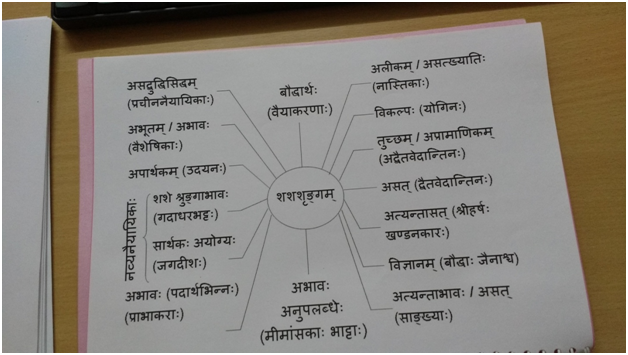--- Vidvan Sati Shankar
Generally the word ' cognition ' is used for ज्ञानम् whereas 'knowledge ' is for विज्ञानम् ।
ज्ञानम् -----
As quoted in the earlier post and pointed out by Vidvan Hari Narayana Bhat
मोक्षे धीः ज्ञानम् शिल्पशास्त्रादिषु विज्ञानम् - but this is a general statement , not a hard and fast rule.
If one has to survey Indian tradition and explain the term it may consume a lot of time and effort. I shall take up a couple of examples and try to explain.
In Vedic literature the terms - ज्ञानम् - विज्ञानम्- प्रज्ञानम् etc are used to denote ब्रह्मन् ।
उपनिषत् --
सत्यं ज्ञानम् अनन्तं ब्रह्म (तै उ , ब्रह्मानन्दवल्ली)
सत्यम् - ज्ञानम् - अनन्तम् -- these three are विशेषणs of ब्रह्मन् , the विशेष्यम् ।
विशेषणम् , गुणः, उपाधिः - इति अनर्थान्तरम् ।
जैमिनि rules that there cannot be any connection among गुणs , because each one of them qualifies another and as such they are equal --
गुणानां च परार्थत्वात् असंबन्धः समत्वत् स्यात् (मी सू)
ज्ञानशब्दः भावल्युडन्तः ( ल्युट् - ’ कृत्यल्युटो बहुलम् ’ पा)
ज्ञानम् can be अन्तवत् ( having an end) - so the विशेषणम् - अनन्तम्
-- as a result the लौकिकज्ञानम् is अन्तवत् whereas this अलौकिकज्ञानम् is अनन्तम् ।
Another important point --
the usage - ज्ञानं ब्रह्म has got two purposes -
to avoid any कारक , such as कर्तृकारकम् , करणकारकम् etc.
to suggest that it does not have जडरूपता like मृत्तिका etc.
शांकरभाष्यम् --
सत्यादिशब्दा न परस्परं संबध्यन्ते परार्थत्वात् । विशेषणार्था हि ते । अत एव एकैकः विशेषणशब्दः परस्परं निरपेक्षः ब्रह्मशब्देन संबध्यते सत्यं ब्रह्म ज्ञानं ब्रह्म अनन्तं ब्रह्मेति ।
..... ज्ञानं ज्ञप्तिः अवबोधः।भावसाधनः ज्ञानशब्दः न तु ज्ञानकर्तृ ब्रह्मविशेषणत्वात् सत्यानन्ताभ्यां सह ।
.... ज्ञानं ब्रह्मेति कर्तृत्वादिकारकनिवृत्यर्थं मृदादिवत् अचिद्रूपतानिवृत्त्यर्थं च प्रयुज्यते ।
शंकराचार्य rakes up another point -
since ब्रह्मन् is अप्रसिद्ध (not popularly known - esoteric ?) there will be शून्यार्थता like शाशशृङ्गम् ? No , सत्यं , ज्ञानम् and अनन्तम् are both विशेषणs and लक्षणs ---
सत्यादीनाम् अनृतादिधर्मनिवृत्तिपरत्वात् विशेष्यस्य ब्रह्मणः उत्पलादिवत् अप्रसिद्धत्वात्
मृगतृष्णांभसि स्नातः शशशृङ्गधनुर्धरः ।
एष वन्ध्यासुतो याति खपुष्पकृतशेखरः॥
इतिवत् शून्यार्थतैव प्राप्ता सत्यादिवाक्यस्य इति चेत् ? न , लक्षणार्थत्वात् ।
(... यस्मात् लक्षणार्थप्रधानानि विशेषणानि न विशेषणप्रधानान्येव । .... समानजातीयेभ्य एव निवर्तकानि विशेषणानि विशेष्यस्य । लक्षणं तु सर्वत एव यथावकाशप्रदात्राकाशमिति )
विशेषणत्वे’पि सत्यादिशब्दानां लक्षणार्थप्राधान्यम् इति अवोचाम। शून्ये हि लक्ष्ये अनर्थकं लक्षणवचनं , लक्षणार्थत्वात् मन्यामहे न शून्यार्थता इति ।
( उत्पलादिवत् अप्रसिद्धत्वात् -- वैधर्म्येण दृष्टान्तः - यथा उत्पलादि प्रसिद्धं तथा ब्रह्म न प्रसिद्धम् -- Korada)
शंकराचार्य further clarifies the meaning of ज्ञानं ब्रह्म --
this does not mean --- ' ज्ञानम् means ब्रह्म ’ - but ’ ज्ञानम् is a sign of ब्रह्मन् ’ - there is no वाच्यवाचकभाव but सामानाधिकरण्यम् - ओमित्येकाक्षरं ब्रह्म ।
(depending on विवक्षा , in some cases there can be तादात्म्यम् or वाच्यवाचकभाव -- ’ तस्य वाचकः प्रणवः ’ - योगसूत्रम् । ओमित्येकाक्षरं ब्रह्म , वृद्धिः आदैच् , अमरा निर्जरा देवाः - तादात्म्यम् - ’ भेदसहिष्णुः अभेदोपचारः)
-- अत एव च न ज्ञानकर्तृ ,तस्मादेव च न ज्ञानशब्दवाच्यमपि तद्ब्रह्म । तथापि तदाभासवाचकेन बुद्धिधर्मविषयेण ज्ञानशब्देन तल्लक्ष्यते न तु उच्यते ।
योगानुशासनम् ( 3-17) --
शब्दार्थप्रत्ययानाम् इतरेतराध्यासात् सङ्करः तत्प्रविभागसंयमात् सर्वभूतरुतज्ञानम् ।
How can a संयमी ( the trinity of धारणा , ध्यान and समाधि is called संयमः) can understand the languages of birds and animals - is the question . This सूत्रम् is in response to this question --
there are three things - शब्दः अर्थः and ज्ञानम् (प्रत्ययः) - due to super-imposition - such as --
शब्द एव अर्थः - अर्थ एव ज्ञानम् - ज्ञानमेव शब्दः --- गौरिति शब्दः - गौरित्यर्थः - गौरिति ज्ञानम्
- they are united as an amalgam ( नीरक्षीरवत् सङ्करः - difficult to separate)
if a संयमी can separate the above three then he will be in a position to understand the languages of birds and animals .
व्याकरणम् --
This system is built depending on बौद्धार्थ -- ' अर्थवत् अधातुः अप्रत्ययः प्रातिपदिकम् ’ पा ।
Patanjali , in पस्पशाह्निकम्, explains the meaning of शब्दशब्द as -
येनोच्चारितेन सास्नालाङ्गूलककुदखुरविषाणिनां संप्रत्ययो भवति स शब्दः ।
So संप्रत्ययः (ज्ञानम्) of an अर्थ is to be attained thru शब्द ।
By बौद्धार्थ , words such as शशशृङ्गम् , वन्ध्यापुत्रः etc are also covered - i e although there is no a thing that is tangible it can be taken as a प्रातिपदिकम् ।
योगिन्s call the same as विकल्पात्मकज्ञानम् ( यो सू 1-9) --
शब्दज्ञानानुपाती वस्तुशून्यो विकल्पः ।
शब्दं ज्ञानं च अनुपततीति शब्दज्ञानानुपाती - अर्थरहित इत्यर्थः ।
अर्थ is of two types - वस्तु (real) and बौद्धार्थ (imaginary).
श्रीहर्ष in his खण्डनखण्डखाद्यम् (खण्डखाद्यम् is an Ayurvedic tonic) quotes the famous line from Kumarila's श्लोकवार्तिकम् --
अत्यन्तासत्यपि ज्ञानम् अर्थे शब्दः करोति च।

